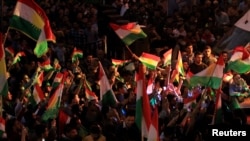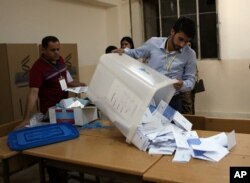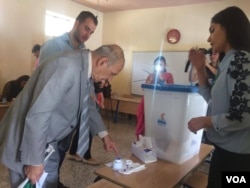Iraqi Kurdish leader Masoud Barzani on Tuesday claimed victory in the referendum vote for independence and called for a "dialogue" with Iraqi authorities, who have rejected the vote as unconstitutional.
"Instead of harassment, let's have dialogue for a better future,'' he said, adding, "Negotiations are the right path to solve the problems, not threats or the language of force."
On Monday, Iraqi Kurds voted on an independence referendum that drew objection from the government in Baghdad, as well as neighboring countries and the United States.
In response to the vote, Iraqi Prime Minister Haider al-Abadi threatened to ban all flights into and out of the Kurdish region if leaders there didn't concede control of airports to federal authorities.
Al-Abadi said the Kurdish region has until Friday to hand over the airports or the ban will be put into place.
The referendum vote is non-binding, but Barzani said he hopes the "yes" vote will lead to increased dialogue between the Kurds and Iraqi government.
"I call on Mr. Haider al-Abadi and the others [Iraqi political officials] not to close the door to dialogue, because it is dialogue that will solve problems," he said in a televised address. "We assure the international community of our willingness to engage in dialogue with Baghdad."
Watch: Independence vote celebrations
At the polls in the Kurdistan Regional capital, many voters donned traditional clothes and carried Kurdish flags, saying they believed this vote could be the beginning of the realization of their dream for independence.
"It is a true day for us," said Mohammad, carrying his toddler son and a flag at a polling station in Irbil. "We have been waiting for 100 years for this. It is beautiful."
Precincts reported high turnouts and a peaceful vote, but before the last ballot was cast, leaders in Baghdad had already sent troops toward disputed areas claimed by both Iraq and Irbil. Al-Abadi has vowed to take all "necessary measures" to preserve Iraqi unity.
Barzani has been consistently defiant, saying the independence vote was the will of the Kurdish people and "out of his hands."
"Independence will allow us not to repeat past tragedies," he said Sunday. "The partnership with Baghdad has failed and we will not return to it."
A spokesman for U.N. Secretary-General Antonio Guterres called the decision to hold the referendum in disputed areas "particularly destabilizing."
"The Secretary-General regrets that the opportunity for serious negotiations to resolve outstanding issues between the Government of Iraq and the Kurdistan Regional Government, based on the constitution and in a spirit of partnership and mutual respect, were not fully seized prior to this move," the spokesman said in a statement.
U.S. State Department spokeswoman Heather Nauert said the United States is "deeply disappointed" with the decision to hold a unilateral referendum. She added that the U.S. relationship with the Iraqi Kurds will not change, but that the vote will "greatly complicate" Kurdish relationships with the Iraqi government and neighboring countries.
Barzani told VOA's Persian Service last week that following the referendum, the Kurdish government would begin discussions with Iraqi officials on such issues as border demarcation, division of natural resources and a timeline for declaring independence. Barzani estimated the transition time would be one to two years.
The Kurds and the Iraqi government have long-running disputes over oil revenues and who controls several key cities in the region.
Before the vote, Prime Minister Abadi called on other countries not to import Kurdish oil.
Neighboring Iran, which, like Syria and Turkey has a large Kurdish population, stopped all flights to Iraq's Kurdish region.
The Iranian and Turkish governments have expressed opposition to the independence referendum over fears it could boost similar separatist sentiment in their countries.
Syrian state media quoted Foreign Minister Walid Moallem rejecting the vote and reiterating that Syria recognizes a unified Iraq.
Turkey has battled a three-decade insurgency by Kurdish rebels in its southeast and the Turkish Foreign Ministry dismissed the vote as illegal and illegitimate. It said countries should not recognize the Kurdish action and warned Turkey "will take every measure that emanates from international law" if terrorists seeking to exploit the circumstances resulting from the referendum threaten Turkish national security.
WATCH: Iraqi Kurds Defiant as They Vote in Referendum
Turkish President Recep Tayyip Erdogan said his country would close a border crossing with Iraq and could move to block oil exports.
Other nations, such as the United States, have said they oppose the referendum on the grounds it takes focus away from the battle against the Islamic State group.





